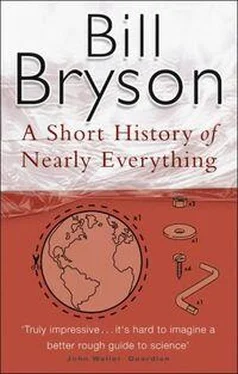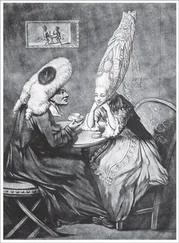“about the same number of components . . .” New Scientist , title unnoted, December 2, 2000, p. 37.
“no more than about 2 percent . . .” Brown, p. 83.
“scientists began to find it all over the place . . .” Brown, p. 229.
“It is converted into nitric oxide in the bloodstream . . .” Alberts et al., Essential Cell Biology , p. 489.
“‘some few hundred’ different types of cell . . .” De Duve, vol. 1, p. 21.
“If you are an average-sized adult . . .” Bodanis, The Secret Family , p. 106.
“Liver cells can survive for years . . .” De Duve, vol. 1, p. 68.
“not so much as a stray molecule . . .” Bodanis, The Secret Family , p. 81.
“Hooke calculated that a one-inch square of cork . . .” Nuland, p. 100.
“After he reported finding ‘animalcules’ . . .” Jardine, p. 93.
“there were 8,280,000 of these tiny beings . . .” Thomas, p. 167.
“He called the little beings ‘homunculi’ . . .” Schwartz, p. 167.
“In one of his least successful experiments . . .” Carey (ed.), The Faber Book of Science , p. 28.
“ all living matter is cellular.” Nuland, p. 101.
“The cell has been compared to many things . . .” Trefil, 101 Things You Don’t Know About Science and No One Else Does Either , p. 133; and Brown, p. 78.
“a jolt of twenty million volts per meter.” Brown, p. 87.
“approximate consistency ‘of a light grade of machine oil’ . . .” Nuland, p. 103.
“up to a billion times a second . . .” Brown, p. 80.
“the molecular world must necessarily remain . . .” De Duve, vol. 2, p. 293.
“100 million protein molecules in each cell . . .” Nuland, p. 157.
“At any given moment, a typical cell . . .” Alberts et al., p. 110.
“Every day you produce and use up . . . ” Nature , “Darwin’s Motors,” May 2, 2002, p. 25.
“On average, humans suffer one fatal malignancy . . . ” Ridley, Genome , p. 237.
“the single best idea that anyone has ever had . . . ” Dennett, Darwin’s Dangerous Idea , p. 21.
CHAPTER 25 DARWIN’S SINGULAR NOTION
“Everyone is interested in pigeons . . .” quoted in Boorstin, Cleopatra’s Nose , p. 176.
“You care for nothing but shooting, dogs, and rat-catching . . .” Quoted in Boorstin, The Discoverers , p. 467.
“The experience of witnessing an operation . . .” Desmond and Moore, Darwin , p. 27.
“some ‘bordering on insanity’ . . .” Hamblyn, The Invention of Clouds , p. 199.
“In five years . . . he had not once hinted . . .” Desmond and Moore, p. 197.
“atolls could not form in less than a million years . . .” Moorehead, Darwin and the Beagle, p. 239.
“It wasn’t until . . . Darwin was back in England . . .” Gould, Ever Since Darwin , p. 21.
“How stupid of me not to have thought of it!” Sunday Telegraph , “The Origin of Darwin’s Genius,” December 8, 2002.
“It was his friend the ornithologist John Gould . . .” Desmond and Moore, p. 209.
“These he expanded into a 230-page ‘sketch’ . . .” Dictionary of National Biography , vol. 5, p. 526.
“I hate a barnacle as no man ever did before.” Quoted in Ferris, Coming of Age in the Milky Way , p. 239.
“Some wondered if Darwin himself might be the author.” Barber, p. 214.
“he could not have made a better short abstract.” Dictionary of National Biography , vol. 5, p. 528.
“This summer will make the 20th year (!) . . .” Desmond and Moore, pp. 454-55.
“whatever it may amount to, will be smashed.” Desmond and Moore, p. 469.
“all that was new in them was false . . . ” Quoted by Gribbin and Cherfas, p. 150.
“Much less amenable to Darwin’s claim of priority . . .” Gould, The Flamingo’s Smile, p. 336.
“He referred to himself as “the Devil’s Chaplain’. . .” Cadbury, p. 305.
“felt ‘like confessing a murder.’ ” Quoted in Desmond and Moore, p. xvi.
“The case at present must remain inexplicable . . .” Quoted by Gould, Wonderful Life , p. 57.
“By way of explanation he speculated . . .” Gould, Ever Since Darwin , p. 126.
“Darwin goes too far.” Quoted by McPhee, In Suspect Terrain , p. 190.
“Huxley . . . was a saltationist . . .” Schwartz, pp. 81-82.
“The eye to this day gives me a cold shudder.” Quoted in Keller, The Century of the Gene , p. 97.
“absurd in the highest possible degree . . .” Darwin, On the Origin of Species (facsimile edition), p. 217.
“Darwin lost virtually all the support that still remained . . .” Schwartz, p. 89.
“It had a library of twenty thousand books . . .” Lewontin, It Ain’t Necessarily So , p. 91.
“known to have studied Focke’s influential paper . . .” Ridley, Genome, p. 44.
“Huxley had been urged to attend by Robert Chambers . . .” Trinkaus and Shipman, p. 79.
“bravely slogged his way through two hours of introductory remarks . . .” Clark, p. 142.
“One of his experiments was to play the piano to them . . .” Conniff, p. 147.
“Having married his own cousin . . .” Desmond and Moore, p. 575.
“Darwin was often honored in his lifetime . . .” Clark, The Survival of Charles Darwin , p. 148.
Darwin’s theory didn’t really gain widespread acceptance . . .” Tattersall and Schwartz, Extinct Humans , p. 45.
“seemed set to claim Mendel’s insights as his own . . .” Schwartz, p. 187.
CHAPTER 26 THE STUFF OF LIFE
“roughly one nucleotide base in every thousand . . .” Sulston and Ferry, p. 198.
“The exceptions are red blood cells . . .” Woolfson, Life Without Genes , p. 12.
“guaranteed to be unique against all conceivable odds . . .” De Duve, vol. 2, p. 314.
“to stretch from the Earth to the Moon . . .” Dennett, p. 151.
“twenty million kilometers of DNA . . .” Gribbin and Gribbin, Being Human , p. 8.
“among the most nonreactive, chemically inert molecules . . .” Lewontin, p. 142.
“It was discovered as far back as 1869 . . .” Ridley, Genome , p. 48.
“DNA didn’t do anything at all . . .” Wallace et al., Biology: The Science of Life, p. 211.
“The necessary complexity, it was thought . . .” De Duve, vol. 2, p. 295.
“Working out of a small lab . . .” Clark, The Survival of Charles Darwin , p. 259.
“no consensus ‘as to what the genes are’ . . .” Keller, p. 2.
“we are in much the same position today . . .” Wallace et al., p. 211.
“worth two Nobel Prizes . . .” Maddox, Rosalind Franklin , p. 327.
“not to give Avery a Nobel Prize.” White, Rivals , p. 251.
“a member of a highly popular radio program called The Quiz Kids . . .” Judson, The Eighth Day of Creation , p. 46.
Читать дальше












